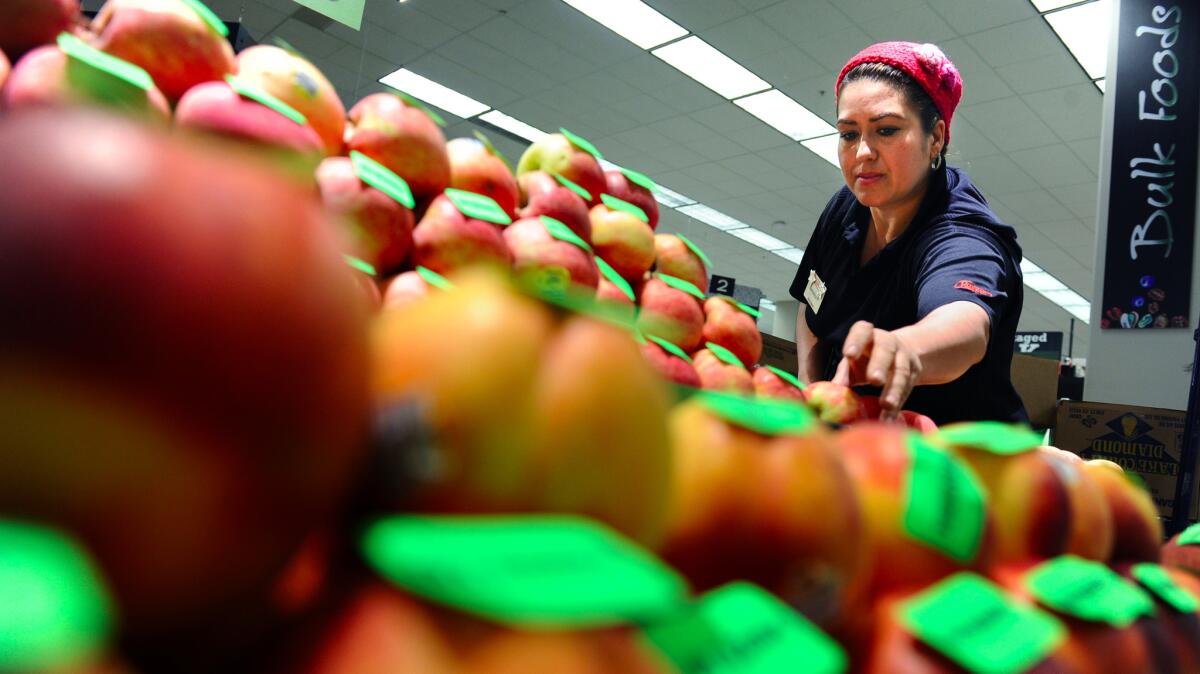Grocery workers approve a strike against supermarkets

- Share via
Grocery workers across Southern California voted to authorize a strike against Ralphs and Albertsons, which includes Vons, Pavilions and Safeway stores, union officials reported.
The vote by 47,000 United Food and Commercial Workers members gives union officials the power to call for a strike if the supermarkets don’t back down on their demands. The grocery companies and union have 10 meetings scheduled through the end of July.
The supermarkets have offered one 10-cent per hour wage increase through 2018, as well as two bonuses of 10 cents an hour and 15 cents an hour during that time, according to Rick Icaza, the president of United Food and Commercial Workers Local 770.
He said the stores also would not fund healthcare beyond current levels, forcing employees to contribute more or sacrifice coverage; reducing their future contributions to pensions; and forcing employees to retire at 65 rather than 60.
“People were so enthusiastic; they wanted to go on strike right away,” said Icaza.
Kendra Doyel, a spokeswoman for Ralphs, said the company is committed to hammering out an agreement over the course of the next month.
“We’re not surprised” at the strike authorization vote, she said. “It’s just part of the process.”
This is the fourth contract negotiation since 2004, the year the two sides finally settled a grinding, 141-day walkout, the longest major supermarket strike in national history.
Ralphs and Albertsons lost $1.5 billion in sales because of that strike. Another strike could be devastating, for both the stores and their workers.
“Both sides lost so much money and market share from the 2003-04 strike that neither side could financially afford to take a prolonged strike” in subsequent negotiations, said Burt Flickinger III, the managing director of the consulting firm Strategic Resource Group.
Veteran grocery workers absorbed a 35% cut to their pensions to make a deal in 2004, while new employees took an even sharper cut. Clerks, meat cutters and baggers have seen their pay decline since then, after adjusting for inflation.
The supermarkets, meanwhile, have lost their tight grip on the country’s largest grocery market. In 2004, Ralphs, Albertsons and Vons/Pavilions held almost 60% of the Southland’s grocery trade, according to the Strategic Resource Group. Now those stores control about 33%.
Follow me @NatalieKitro on Twitter.
ALSO
How a South L.A. supermarket proposal fell apart, after a decade of effort
Trader Joe’s agrees to cut greenhouse gas emissions in court settlement
Column: California is a magnet — and a graveyard — for supermarket competitors
More to Read
Inside the business of entertainment
The Wide Shot brings you news, analysis and insights on everything from streaming wars to production — and what it all means for the future.
You may occasionally receive promotional content from the Los Angeles Times.











